The COVID-19 pandemic has transformed our lives and the world around us. Yet one of the most important and sobering aspects of the pandemic has gotten relatively little attention. We are not only experiencing huge changes in how we live day-to-day, but we have moved into a world of far greater unknowability about the future.
How is this vast unknowability affecting how people think about foreign policy, and particularly U.S.-China relations? Here, I explore how it affects what we think, do, and write, and also how it affects us as individuals personally engaged in this field.
COVID-19 and the unknowable
Much of the universe is unknowable to us. Whether religious or not, we live with pervasive mysteries, from how the universe was created and how to understand good and evil to what explains genius or beauty or love. Most of our daily lives are isolated from such unanswerable questions. But even in our jobs, families, and civic life, there are usually many relevant things we do not know before we act, and wisdom is often seen as the ability to act reasonably in a situation of limited and imperfect knowledge.
In the world of foreign policy, and especially in times of crisis, the best leaders and diplomats are certainly experts with a great deal of knowledge, but they are typically experts who also know the limits of their knowledge. They act with imperfect information and often under great time pressure, and have the humility to listen to others. The best ones have a track record of making good judgments under those constrained conditions.
But COVID-19 has created a radically greater degree of unknowability in numerous realms. For U.S. foreign policy decisionmakers, there is now a long list of the things that are not and often cannot be known:
- We cannot predict the path of the virus, namely whether and where there will be large new surges.
- We cannot predict the pace or pathways of treatments and vaccines. Once developed, how will they be manufactured, priced, and distributed when demand greatly exceeds supply? Since no international rules are being made behind our current “veil of ignorance,” will we be able to avoid major geopolitical conflict if people in one country, or in just a few countries, develop these medicines first?
- We cannot predict the economic consequences of the virus. The scale of the negative impact is already enormous, but how bad will things get, for how long, distributed in what ways?
- No one knows how the steps taken to defeat COVID-19 will permanently change our daily lives, e.g., conducting work online or being subjected to intrusive and non-consensual methods of surveillance, with significant privacy implications.
- No one knows the longer-term political impact. Will current leaders be swept out of office around the world? Will political systems change — either because authoritarian “order” starts looking preferable to democracy’s “disorder,” or because democracies’ transparency looks far preferable to authoritarian cover-ups and secrecy? How will migrations from fragile states with poor health systems affect global politics?
Similarly, no one knows whether the global dynamic will continue moving in separate nationalist directions or whether there will be a reawakening and even a deepening of global collaboration and global institutions to address COVID-19’s consequences. Global institutions and multilateral institutions such as the EU are currently embattled. What kind of global order or disorder will emerge in the face of continuing global challenges like new pandemics, climate change, and nuclear proliferation, that loom with the devil’s grin?
No one knows who will win the U.S. presidential election in November. COVID-19 has greatly affected the degree of unknowability. If presumptive Democratic nominee Joe Biden is elected, the path forward for the United States will be radically different than if Donald Trump is re-elected.
No one knows what President Trump will do between now and the election. Seeking to improve his re-election prospects in spite of the terrible effects of COVID-19, his actions are basically unknowable since he is an unpredictable person and willing to take large risks when in political difficulty. And these unknowable short-term actions could have continuing effects even if Trump is defeated for re-election.
Unknowables affecting U.S.-China relations
Far more than has been acknowledged, these vast unknowabilities are affecting people who work in the foreign policy field — affecting what we think and write, and also affecting us as individuals personally engaged in this field. This is certainly true for people working on U.S.-China relations.
U.S.-China relations are clearly moving in a sharply negative direction on virtually every front. Although the basic arc towards a more competitive relationship preceded the Trump presidency, during his presidency the relationship has greatly deteriorated. The U.S.-China relationship today is at its worst point since the two countries normalized their relations in 1979.
At least four factors make the future path of U.S.-China relations remarkably unknowable.
1. First, how COVID-19 evolves will affect the strength of both countries. Both the “hard power” and “soft power” of each county are being substantially affected, but in ways that are still largely unknowable.
Regarding hard power, the uncertainties about the medical and economic effects affect both the United States and China. In the U.S., the economic damage has already been great and could become greater, and the impact on our national budget will constrain military and other expenditures that have direct effects on our relationship with China. The success of the Trump administration’s aggressive efforts to “decouple” parts of our economy from China is unclear, and the economic and geopolitical effects of such decoupling is essentially impossible to determine.
In China, the economic damage from COVID-19 has also been enormous; and even though its economy has been re-opening earlier than other countries, the downward pressures on growth remain, particularly since China’s economy depends so much on trade and investment from other countries whose economies are in deep trouble. The unknowable degree of economic downturn will have a significant impact on China’s military budget, its overseas investments as part of its Belt and Road Initiative, and the self-confidence that has driven its goals for “great rejuvenation of the Chinese nation,” including on the international stage and in relation to the United States. If one country “beats” the other in developing an effective vaccine against COVID-19 (itself unpredictable given the multiple efforts worldwide), unknowable tensions could develop.
The strength of each country’s soft power is also hugely uncertain. China’s image and influence have faced contradictory trends: 1) a sharply negative dynamic because of its initial concealment of information about the COVID-19 outbreak and ongoing behavior of diplomats acting like “wolf warriors”; 2) a mixed dynamic because of its extensive provision of personal protective equipment, because those were very helpful yet some were of poor quality, and also because Chinese diplomats at times bluntly insisted on public displays of gratitude; 3) a positive dynamic because of Xi Jinping’s constructive speech to the World Health Organization (WHO) on May 19 — only words, to be sure, but words that in the past would have been quite familiar in a speech by the U.S. president speaking as the global leader. This soft power gain was almost immediately undermined, however, by China’s audacious May 22 announcement that it will adopt a national security law for Hong Kong.
U.S. soft power has long been an exceptional strength on the world stage. But it has suffered enormously during the Trump presidency, and has been further weakened by President Trump’s unprepared and dysfunctional response to COVID-19, his transparent and ugly effort to shift blame to China for the consequences of his own failings, his lack of either domestic or international leadership, his refusal to cooperate with other countries, his crude rebuff of the WHO, and his daily bizarre and contradictory words and deeds about the virus.
The U.S. is still significantly stronger in both hard power and soft power. But the two countries’ actual and perceived strength over the short- to-medium term has never been more uncertain — and this makes the fundamental dynamics of the U.S.-China relationship very uncertain.
2. Second, the presidential contest between Donald Trump and Joe Biden on November 3 will have an enormous effect on the U.S.-China relationship, and yet the outcome of the election is totally unknowable. Even in the months before the election, we do not know how far the escalation of hostility between our two countries will go, especially given President Trump’s efforts to blame China for COVID-19’s effects, China’s propaganda efforts to overcome damage from its early cover-up, and responses to each other’s provocations.
If President Trump is re-elected, his administration’s increasing hostility to China will almost certainly widen and deepen, a 21st-century Cold War become entrenched, risks of military conflict increase, and cooperation with China and other countries in addressing global challenges further reduced. The U.S. will continue to weaken global institutions, opening opportunities for China to play roles as a self-described “global leader.” The making and execution of foreign policy will remain mostly chaotic and unpredictable, and the advice of experts and diplomats with detailed knowledge and deep experience related to China largely ignored.
If Biden is elected, he will certainly be tougher on China than when he was as vice president in the Obama administration — the world has changed, and the United States and China are competitors and rivals in multiple spheres. But Biden would have a fundamentally different approach to the U.S.-China relationship than a re-elected Trump: in the substance of his administration’s likely strategy and policy, as well as the processes by which those strategies and policies are made and executed. He will be tough on China in combatting its unfair economic practices, especially those affecting the U.S. middle class. At the same time, he seems to view considerable economic interdependence as, on balance, beneficial if supplemented by much-improved U.S. competitive strength and domestic protection of U.S. workers. He appears to view extreme economic decoupling as unrealistic and harmful.
He would be much tougher on China than Trump on some matters — for example, human rights. And he would work with our allies to gain more leverage over China to change its behavior on these fronts. But Biden’s approach to the U.S.-China relationship would see the need to cooperate with China on multiple issues that Trump has recklessly ignored: climate change, pandemics, and nuclear proliferation in places like Iran. Strategic competition and rivalry with China will need to be implemented in ways that do not ignore or destroy the dynamics of necessary cooperation.
Strategic competition and rivalry with China will need to be implemented in ways that do not ignore or destroy the dynamics of necessary cooperation.
Finally, Biden’s approach to global institutions is that they need to be reformed and updated, not abandoned, with America acting as and seen by other countries as a renewed and admired global leader. The specifics of Biden’s China policy would of course need to be worked out, but the starting points will be different and the methods of carrying out the policy will have the consistency and diplomatic focus of U.S. foreign policy prior to Trump.
In short, the outcome of the November election will make a huge difference to U.S.-China relations, but that outcome is today unknowable.
3. Third, there is heightened uncertainty about Xi Jinping’s political strength within China. Although experienced China hands constantly say that China is not a monolith and that many different voices exist both within the Chinese Communist Party and Chinese society, Xi Jinping has consolidated power in a single person more than at any time since Mao Zedong, and so carries responsibility for both the early concealment and the later apparently successful containment of the virus. Domestic opinion incorporates both of these enormously consequential facts, with an uncertain residue and a still-evolving economic fallout. The degree of negative worldwide reaction to China’s actions and international propaganda campaign so far during the pandemic has hurt China and is presumptively Xi’s fault, and this is probably strengthening the views of those who think that Xi is regularly over-reaching, and that his consolidation of power exceeds its benefits. His political position must now be deemed uncertain.
In short, the almost complete uncertainty about the future political leadership on the U.S. side is at least paralleled by greater than usual uncertainty about China’s leadership, further adding to the unknowables in the U.S.-China relationship.
4. Fourth, broad uncertainties about COVID-19’s effects on all the other countries in the world add very significantly to the uncertainties about the U.S.-China relationship. In much of Europe, Asia, and the developing world, public health, economics, and politics are in turmoil. How these developed countries choose to navigate their relations with both Washington and Beijing in their situations of crisis, something that is still unknowable, is likely to affect the U.S.-China relationship itself. If, as expected, the virus powerfully hits African and Latin American countries, how will their hardships and crises regarding debt repayments and other issues be handled by the U.S. and China? What will be the effects on their relationships with both countries, and the effects on U.S.-China relations?
Unknowables and writing about U.S.-China relations
These huge unknowables greatly complicate the work of policy experts devoted to writing about U.S.-China relations. Historians and international relations theorists can comfortably continue their work illuminating the past and providing analytical tools for thinking about the present and the future. But what about others?
[The] huge unknowables greatly complicate the work of policy experts devoted to writing about U.S.-China relations.
To simplify considerably, policy experts typically write three kinds of essays: predictive, critical, prescriptive.
Predictive articles have tried to anticipate, for instance: whether there would be a U.S.-China trade deal and, if so, what kind of a deal to expect; how the U.S. and China would each respond to the protests in Hong Kong; and the degree of decoupling between the U.S. and Chinese economies. In ordinary times, these predictions are enjoyable to read and are usually proven wrong, but no one is counting. Given the extreme unknowability of so much in the world today, predictive articles certainly can’t be called well-grounded “expert” judgments. Almost anything specific seems to have little credibility.
Critical articles, from all political perspectives, criticize what U.S. or Chinese leaders have said or done. Both countries have given and continue to give policy experts much fodder for these critiques. But their value seems limited nowadays. The factual premises for such articles have become less clear as so many facts have become unknowable or have changed. At every turn, U.S.-China policy intersects epidemiological variables that are beyond our expertise. In the midst of a presidential campaign, candidates’ remarks are mostly motivated by domestic U.S. political judgments rather than foreign policy choices, and our expertise is the latter. With officials facing pervasive crises, outside experts are unlikely to get a government audience. All this, on top of the sense for many of us that the U.S.-China relationship has entered a grim and irrational stage — e.g., the president of the United States tweets about the “wacko” Chinese and says that China is engaged in “mass Worldwide killing,” and official Chinese media distributes a 90-second cartoon attacking Secretary of State Pompeo via caricature. What can we write in our voice as experts that “criticizes” a reality that seems so far from what is sensible and wise?
Prescriptive writing makes policy recommendations. It’s normative, focusing on what should happen, rather than predicting the future or criticizing the past. However, both predictions and criticisms are usually some part of prescriptive writing, because the best prescriptive writing is realistic, not utopian, focusing on recommendations that seem plausible in the real world.
The vast unknowables today complicate prescriptive writing about U.S.-China relations. Most obviously, not knowing who will be elected president in November affects the whole project of prescriptive writing. Of course, prescriptive policy writing in presidential election years always faces some uncertainty about who will win, but this year’s political uncertainty creates unusual difficulties for experts, since the election involves a uniquely aberrational incumbent president, China has become a centrally divisive issue, outcome uncertainties are compounded by unique COVID-19 unknowables, and outcome uncertainty is framed by the fact that President Trump’s initial election defied predictions of virtually all the pollsters.
Experts should be prepared with policy proposals for whoever is elected, and should provide analysis to any U.S. administration if asked. But if one assumes that Trump will be re-elected, most expert prescriptions would be fanciful. One has to assume a basic continuity of current policy and policymaking process, which most experts have vigorously criticized. In any event, Trump and his senior officials listen to only a tiny handful of outside people, so most “prescriptive” writing will have no audience.
Prescriptive writing has much broader potential if one assumes that Biden is elected. As president he will develop his own China policies, and, as indicated above, there is little doubt that those policies would be significantly different from Trump’s. Biden and the likely members of his administration would be more open to prescriptive advice from well-informed outsiders, and now is a good time to be doing prescriptive writing premised on a Biden presidency — setting forth principles, policies, and strategies that the United States should adopt. But such writing is premised on a political outcome that is totally unknowable and that may not happen. In addition, most policy experts usually take care to avoid having their public writing be openly partisan, so are likely to frame their prescriptions in terms of “whoever is elected,” yet it will be hard to avoid a specific statement of the Biden premise.
In spite of all of these unknowns, the response cannot be silence. Experts on U.S.-China relations must continue writing and speaking.
Nevertheless, prescriptive writing about what a U.S.-China policy should be if Biden is elected president is a valuable effort, and one this writer himself undertakes. But in addition to being based on an unknowable political premise, writers must recognize the stunning array of other unknowables related to future U.S.-China policy, most obviously the still-unknown medical path and degree of economic crises from COVID-19 that will be profound factors in shaping a future Biden policy towards China. In addition, with current relations between the U.S. and China so hostile, and with each country continuing the escalation of provocative words and deeds, there is a substantial risk that before January 20, 2021, there will be an extraordinary further escalation involving Taiwan, Hong Kong, or the South China Sea (including potential military conflict) that will create new and sharp constraints on what a President Biden could do to modify U.S. policy toward China. Indeed, one realm of “prescriptive” writing that still makes sense for the remainder of 2020 is for experts in both countries to highlight these dangerous risks again and again, strongly recommend restraint on both sides, and try to build media and political pressure to avoid this worst-case outcome.
In spite of all of these unknowns, the response cannot be silence. Experts on U.S.-China relations must continue writing and speaking. This is what we do and who we are. Drowning our minds in the swamp of the unknowable or surrendering our will to pessimism about the current state of the U.S.-China relationship must be rejected. We must work with what we do know, admit what we do not, and push ahead with writing that reflects both idealism and realism. No one should give up the effort, even though no one knows whether that effort will succeed.
The Brookings Institution is committed to quality, independence, and impact.
We are supported by a diverse array of funders. In line with our values and policies, each Brookings publication represents the sole views of its author(s).
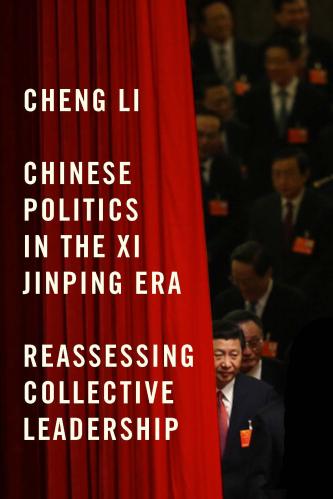
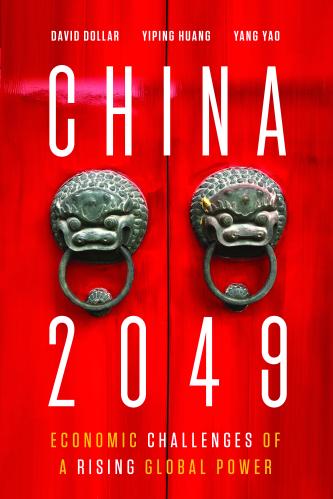
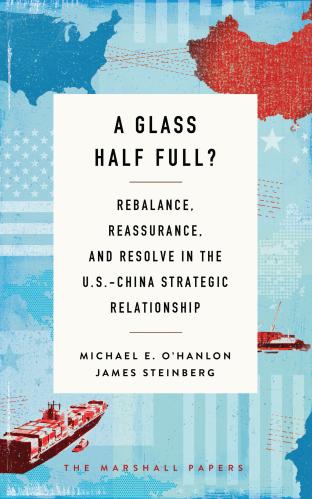
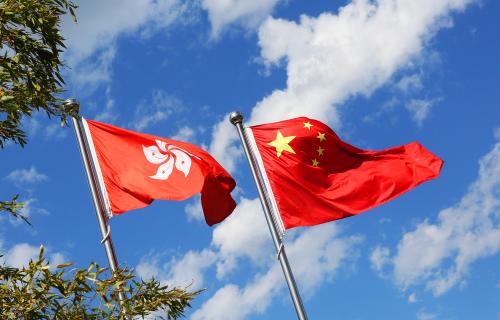
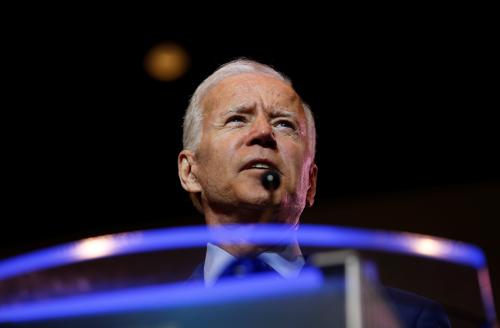
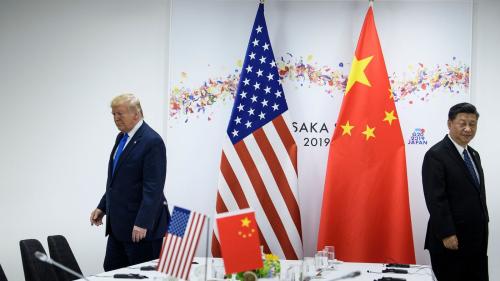




Commentary
Op-edNo one knows: How the unknowable consequences of COVID-19 affect thinking about foreign policy and US-China relations
June 1, 2020